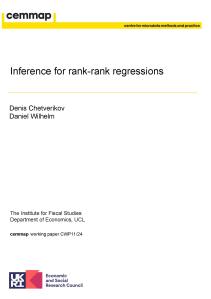<p><p><p>This paper considers parametric estimation problems with independent, identically,non-regularly distributed data. It focuses on rate-effciency, in the sense of maximal possible convergence rates of stochastically bounded estimators, as an optimality criterion,largely unexplored in parametric estimation.Under mild conditions, the Hellinger metric,defined on the space of parametric probability measures, is shown to be an essentially universally applicable tool to determine maximal possible convergence rates. These rates are shown to be attainable in general classes of parametric estimation problems.</p></p></p>
Authors

Research Associate Birkbeck, University of London
Walter is a Research Associate at the IFS, a Reader in Economics at Birkbeck, University of London and holds a position in the Academic Panel at CMA.

Daniel McFadden
Working Paper details
- DOI
- 10.1920/wp.cem.2007.2807
- Publisher
- IFS
Suggested citation
Beckert, W and McFadden, D. (2007). Maximal uniform convergence rates in parametric estimation problems. London: IFS. Available at: https://ifs.org.uk/publications/maximal-uniform-convergence-rates-parametric-estimation-problems (accessed: 30 June 2024).
Related documents
More from IFS
Understand this issue

Gender norms, violence and adolescent girls’ trajectories: Evidence from India
24 October 2022

What are the challenges in getting debt on a falling path?
28 June 2024

Election Special: Your questions answered
27 June 2024
Policy analysis

ABC of SV: Limited Information Likelihood Inference in Stochastic Volatility Jump-Diffusion Models
We develop novel methods for estimation and filtering of continuous-time models with stochastic volatility and jumps using so-called Approximate Bayesian Compu- tation which build likelihoods based on limited information.
12 August 2014

Assessing the economic benefits of education: reconciling microeconomic and macroeconomic approaches
This CAYT report discusses the strengths and limitations of several approaches to assessing the effect of education on productivity.
14 March 2013

Misreported schooling, multiple measures and returns to educational qualifications
We provide a number of contributions of policy, practical and methodological interest to the study of the returns to educational qualifications in the presence of misreporting.
1 February 2012
Academic research

Inference for rank-rank regressions
28 May 2024

Understanding Society: minimising selection biases in data collection using mobile apps
2 February 2024

The impact of labour demand shocks when occupational labour supplies are heterogeneous
28 June 2024